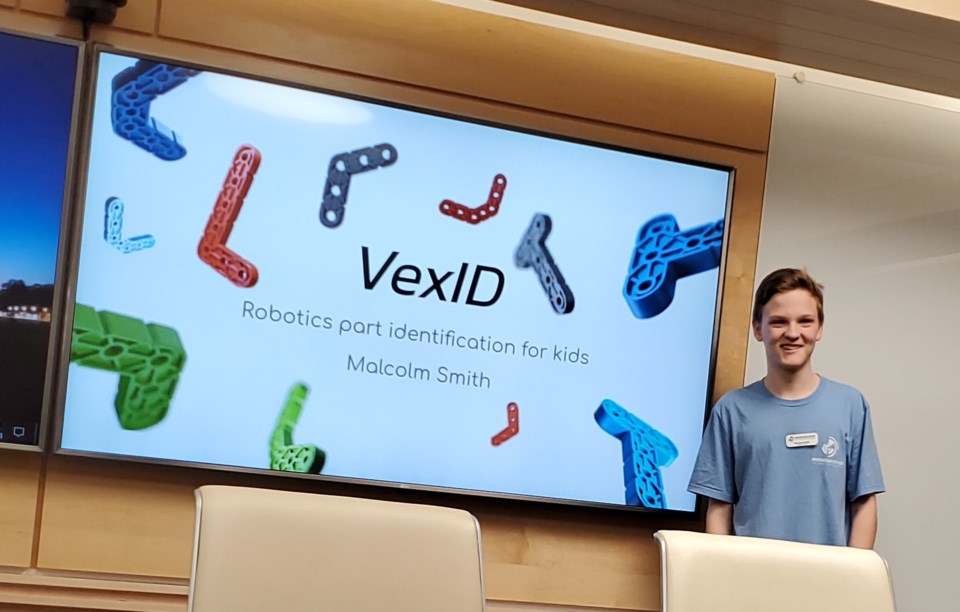Niwot High School junior, Malcolm Smith, emerged victorious in the global arena of artificial intelligence, securing the prestigious bronze award for the World Artificial Intelligence Competition for Youth, WAICY, which took place on December 2 and was announced on December 4.
The Innovation Center of St. Vrain Valley Schools’ FishNET team clinched the gold medal in the previous year’s WAICY with an innovative contribution to fish conservation.
“Last year, we won the gold, but this isn’t just about winning, it’s about nurturing critical minds,” said Mai Vu, the Innovation Center’s AI Program Manager. “We’re sowing the seeds for the future. AI can help solve monumental issues like cancer, but it’s imperative to educate our future leaders about its limitations and possibilities.”
Backed by the Innovation Center, Malcolm Smith’s project VexID was designed to aid young learners in understanding robotics parts through AI-driven tools, and showcased both creativity and practicality, earning him recognition among participants worldwide.
“I built a tool that will help kids learn robotics parts for like kids’ robotics,” Smith said. “Once you have a project, you make a three-minute presentation on it, you present it to the judges, and then we’re evaluated against other students worldwide who are doing the same thing.”
Right before a “Day of AI” at the Innovation Center, Vu brought a handful of her students together to present to the judges via video chat in a conference room upstairs and doted over them like a caring mother as she ushered them through the process.
“We’re not just teaching AI; we’re fostering critical thinking. AI empowers knowledge, but critical thinking is the key to solving future problems,” Vu said. “This is what the competition’s about. We are building a pathway to AI, empowering kids to solve real-world problems.”
The afternoon’s event featured a variety of activities aimed at engaging, educating and inspiring attendees about AI. During the event, participants explored various facets of AI through interactive stations, which included AWS DeepRacer, Google’s Quick Draw Game, Generative Art and an introduction to ChatGPT.
Sessions covered topics such as “Demystifying AI,” and attendees learned about St. Vrain’s efforts to support teachers in effectively incorporating AI into their teaching and classrooms. Hands-on STEM activity stations and the Future-Ready Innovation Mobile Lab were available for all ages to explore, and the evening concluded with an outdoor drone light show.
The day of AI also coincided with WAICY and attendees had the opportunity to observe students presenting their solutions for real-world problems using AI before the light show in the main lecture hall.
With VexID, the image classifier-based robotics kit, Smith aimed to enhance accessibility. Addressing the challenge of machine learning, which requires vast amounts of data, Smith wrote a program to generate simulated pieces, producing over 30,000 diverse images. He integrated a shield that encoded depth information into images, enhancing the model’s understanding of varying perspectives.
Jordan Boldt, a junior at Lyons Middle/Senior High School, and Sierra Ryan, a senior at Erie High School, jointly presented Counselor AI which is an AI chatbot that aims to make post-secondary planning easier for high school students.
The chatbot boasted three key features: aiding students in enhancing their college essays, guiding them in identifying suitable career paths based on interests and assisting in university selection through personalized questions.
They emphasized that their AI aimed to augment rather than replace human counselors, ensuring that no student was overlooked in the post-secondary planning process. They clarified that the AI didn’t generate essays but provided personalized guidance and tips.
Aiden Buchanan, a senior at Erie High School, presented SocialNET which focused on proactive suicide intervention using AI-driven sentiment analysis. His innovation involved a sentiment analysis system that detected depression based on facial expressions and monitored social media messages to gauge emotional states. The model would prompt users showing signs of depression to seek mental health assistance.
“I noticed that teens committing suicide often lack access to self-reported mental health systems, despite a high percentage seeking help from friends rather than professionals. This highlights the need for a proactive approach to detecting mental distress,” Buchanan said.

